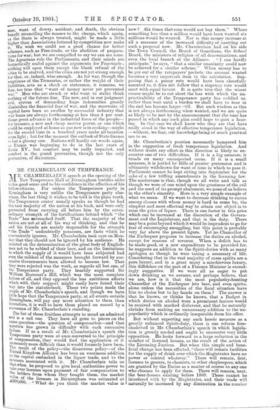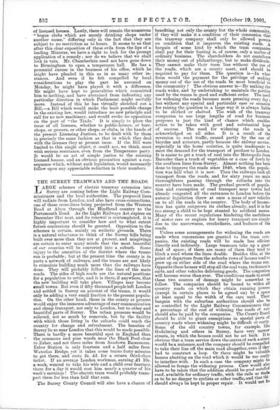MR. CHAMBERLAIN ON TEMPERANCE.
of the AIR CHAMBERLAIN'S N. ew TemperTemperanceHall speech at the o at irming testifies alike opening to his good sense and to his confidence in the affection of his fellow-citizens. For unless. the Temperance party in Birmingham is very unlike the Temperance party else- where, the last thing it wishes to be told is the plain truth. The Temperance orator usually speaks as though he had the, vast majority of the nation at his back, and were only prevented from carrying all before him by the extra- ordinary strength of the fortifications behind which "the Trade' has entrenched itself. That the majority of the nation are not at all of his way of thinking, and that he and his friends are mainly responsible for the strength "the Trade " undoubtedly possesses, are facts which he conveniently ignores. Mr. Chamberlain took care on Mon- day that they should not be ignored by his audience. He insisted on the determination of the great body of English- men not to be robbtd of their beer, and. on the limitations to which the supply of it would have been Subjected had even the mildest of the measures brought forward by suc- cessive Governments been allowed to become law. That they were rejected was the work, as regards all but one, of the Temperance party. They heartily supported Sir William Harcourt's Bill, which was the most complete failure of all, and they opposed the less ambitious efforts which with their support might easily have found their way into the statute-book. These two points made the staple of Mr. Chamberlain's speech, and though we have little hope that the Temperance party, at all events outside Birmingham, will pay any more attention to them than heretofore, it is well to have them placed on record by a statesman of Mr. Chamberlain's standing.
The list of these fruitless attempts to mend an admitted evil is a sad one. They have all gone to pieces on the same question—the question of compensation—and that question- has grown in -difficulty with" each successive failure. If as a result of Mr. Chamberlain's speech the Temperance party were at once converted, to the principle of compensation, they would find the application of it immensely more difficult than it would formerly have been.. The result of the policy—the disastrous policy—of the United Kingdom Alliance has been an enormous addition to the capital embarked in the liquor trade, and to the interests associated with it. Mr. Chamberlain tells us thalivhen he.proposed to give locaL. authorities power . to e over licenses upon payment of fair compensation to the_ holders from - whom they bought them, the market v_alue of the licenses in Birmingham was estimated at .4900,0go, . What do you think the market value is now ? Six times that sum would not buy them." Where something less than a million would have been wanted six millions would be wanted. Nor is this money increase at all a measure of the increased difficulty of carrying out such a proposal now. Mr. Chamberlain had on his side the Town Council, the Board of Guardians, the School Board, the ministers of religion of all denominations, and even the local branch of the Alliance. "I can hardly anticipate," he says, " that a similar unanimity could now be achieved for a similar scheme." When money has to be got out of the ratepayers' pockets, the amount wanted becomes a very important item in the calculation. Sup- posing that a penny rate would have been cheerfully assented to, it does not follow that a sixpenny rate would meet with equal favour. It is quite true that the wisest course might be to cut short the loss with which the im- practicability of the Temperance party has saddled us, rather than wait until a burden we shall have to bear in the end has become larger rtill. But such wisdom as this is not always forthcoming when wanted, and we are quite as likely to be met by the announcement that the time has passed in which any such plan could hope to gain a hear- ing. In that case we shall know who they are that have really stood in the way of effective temperance legislation, —without, we fear, our knowledge being of much practical use to us.
Mr. Chamberlain's position necessarily hampered. him in the suggestion of fresh temperance legislation. And. without doubt any effort in this direction is likely to en- counter one of two difficulties. If it is a big measure, it treads on many unsuspected corns. If it is a small measure, it is jostled by Bills of greater pretension and is ultimately withdrawn for want of time in which to pass it Parliament cannot be kept sitting into September for the sake of a few trifling amendments in the licensing law. The misfortune is that, though we all write and talk as though we were of one mind upon the greatness of the evil and the need of its prompt abatement, we none of us believe in the other's sincerity. Here is a very simple example of what we mean. If we want to decrease drinking to excess among .classes with whom money is hard. to come by, the simplest and most effectual way to attain our object is to raise the price of liquor. There is one factor in this price which can be increased at the discretion of the Govern- ment and the Legislature, and that is the duty. There may be a pointbeiond which it would be imprudent to go for fear of encouraging smuggling, but this point is probably very far above the present figure. Yet no Chancellor of the Exchequer proposes to increase the duties on alcohol, except for reasons of revenue. When a deficit has to be made good, or a new expenditure to be provided for, he suggests an addition to the Spirit-duties with as many apologies as though he were taxing a necessary of life. Considering that in the vast majority of cases spirits are a pure luxury, and in a great many a mischievous luxury, this diffidence on the part of a Finance Minister is exceed- ingly suggestive. .If we were all as eager to put down drinking as we assume, and perhaps believe, that we are, how is it that the most popularity-hunting Chancellor of the Exchequer lets beer, and even spirits, alone unless the necessities of the fiscal situation leave him no choice but to lay hands on them ? The answer is that he knows, or thinks he knows, that a Budget in which duties on alcohol were a prominent feature would be received with marked disfavour, and that he naturally shrinks from making an unnecessary addition to the un- popularity which is ordinarily inseparable from his office.
But without expecting any such heroic measure as a, greatly enhanced Spirit-duty, there is one reform fore- shadowed in Mr. Chamberlain's' speech -in which legislaz tion is greatly needed and ought to encounter very little: opposition. He looks forward to a large reduction in the number of licensed houses, as the result of the action of the Licensing Justices. But when this simple and bene- ficial change has been effected, "there will remain facilities for the supply of drink over which the Magistrates have no power or control whatever." There will remain, first, licenses to grocers, to chemists, to other shopkeepers, which are granted by the Excise as a matter of course to any one who chooses to apply for them. There will remain, next, the beer-houses existing before 1869. These cannot be interfered with by the Magistrates, and, their trade will naturally be increased by any diminution in the number of licensed houses. Lastly, there will remain the numerous " bogus clubs which are merely drinking shops under another name," differing only in the fact that they are subject to no restriction as to hours. It seems to us that after this clear exposition of these evils from the lips of a leading Minister, we have a right to look for the prompt application of a remedy; nor do we believe that we shall look in vain. Mr. Chamberlain need not have gone down to Birmingham to open a temperance hall. He has a perennial excuse in the business of his office, which he might have • pleaded in this as in so many other in- stances. And even if he felt compelled by local considerations to play the part he assumed on Monday, he might have played it with a difference. He might have kept to generalities which committed him to nothing, and have abstained from indicating any particular direction in which Parliament might usefully move. Instead of this he has virtually sketched out• a Bill,—a Bill which would make the least possible change in the existing law, would introduce no new principle and call for no new machinery, and would evoke no opposition on the part of "the Trade." It is simply to place the issue of all licenses, whether to public-houses, or beer- shops, or grocers, or other shops, or clubs, in the hands of the present Licensing Justices, to be dealt with by them in precisely the same fashion as that in which they deal with the licenses they at present issue. If the Bill were limited to this single object, it could .not, we think, meet with.serious resistance, even from the Temperance party. It would be an act of simple justice to the existing licensed houses, and an obvious precaution against a con- sequence which, without such a would, necessarily follow upon any appreciable reduction in their numbers.















































 Previous page
Previous page